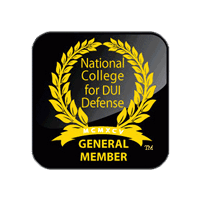DWI Checkpoints – Proper Police Procedure
At some point, we will all likely have to drive through a police checkpoint. Even if you are not doing anything wrong or illegal, it can still be an anxiety producing experience wondering if the officer will find something you don’t know about. A checkpoint is creepy because you are being stopped by the police. It doesn’t feel right, but you know you have to participate. This is what the Fourth  Amendment to our Constitution was supposed to protect us against. However, the courts have chosen to turn a blind eye to this obvious violation of our privacy in the interest of “public safety.” Of course, they appease themselves by placing limitations on such intrusions. The checkpoints cannot be a pretext for otherwise unlawful searches and the intrusion must be brief. But, they are still allowed in the pursuit of the inherently evil person who dares to have a beer at the game or a drink with dinner. Usually police can only stop you in your vehicle if they have reasonable suspicion or probable cause to believe you are breaking the law. The checkpoint appears to defy this principle of search and seizure law by allowing police to randomly stop vehicles to check for license, registration, or insurance. DWI drivers are clearly the intended target although the police also fortuiously often find other law infractions along the way.
Amendment to our Constitution was supposed to protect us against. However, the courts have chosen to turn a blind eye to this obvious violation of our privacy in the interest of “public safety.” Of course, they appease themselves by placing limitations on such intrusions. The checkpoints cannot be a pretext for otherwise unlawful searches and the intrusion must be brief. But, they are still allowed in the pursuit of the inherently evil person who dares to have a beer at the game or a drink with dinner. Usually police can only stop you in your vehicle if they have reasonable suspicion or probable cause to believe you are breaking the law. The checkpoint appears to defy this principle of search and seizure law by allowing police to randomly stop vehicles to check for license, registration, or insurance. DWI drivers are clearly the intended target although the police also fortuiously often find other law infractions along the way.
Nevertheless, they are permitted and have become an ever more anticipated and accepted part of life. But to be tolerated, the police must submit guideline as to where the checkpoint will take place and the method they will be using to decide which vehicles to investigate. Generally police must have a pattern in place to stop vehicles such as they will stop every 7th vehicle or, more commonly, stop every vehicle. While coming up upon one of these checkpoints makes nearly everyone at least a little nervous, it is better to simply go forward and proceed to the checkpoint rather than to try avoid it. In North Carolina, police are also permitted to pull you over if you attempt to avoid a checkpoint. They typically have officers specifically watching for this behavior. Of course, many of us will see flashing blue lights ahead and turn off thinking we can avoid an accident scene and the accompanying delay. But here, clairvoyance manifests, and clearly, a driver is only trying to avoid police interaction. Such is time we now live in.
What You Should Do at a Checkpoint 
First, you should remain calm, even if you have had a drink before getting behind the wheel. Secondly, carefully listen and comply with the officer’s requests. Don’t argue, debate, or attempt to assert any rights. Better to let lawyers raise any legal issues in court. Roadside discussions with police should be kept to an absolute minimum. If arrested, silence is golden. Politely and respectfully decline to discuss your evening’s activities or how much or little you may have had to drink. You can refuse breath testing, but your license to drive will be taken for one year, even prior to any DWI conviction. And now, under NC law, a warrant can be obtained to draw your blood, even against your will. When you get out of jail, you should get some rest and then contact an experienced Charlotte DWI lawyer to review what options you may have to challenge both the checkpoint and any other aspect of your DWI arrest.
Be Safe. Get Home.
